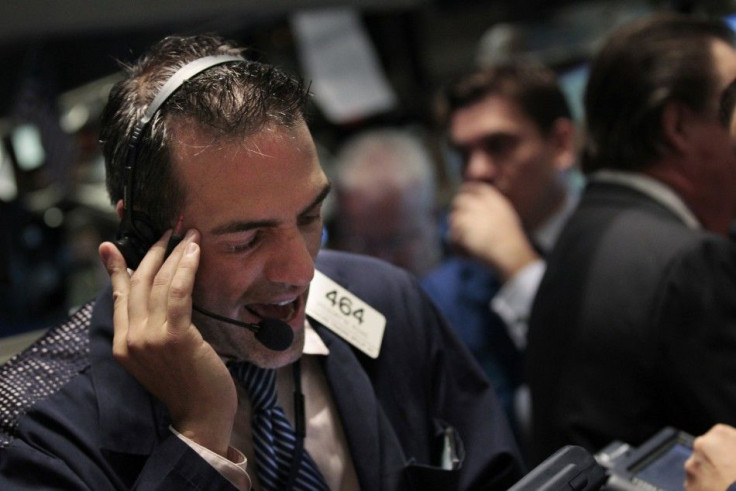Markets Jittery, Food Stamps Rise, Jobs Improve Slightly

Conventional wisdom on Wall Street had it all wrong. They thought the economy was growing and jobs would be created soon because that's what government economists and officials told them. The stimulus was working. Or so they thought.
But now Wall Street knows differently, and the markets have been crashing down in response, shedding huge gains accrued since the Great Recession began in 2008 in the past week-and-a-half.
Last week the government revised GDP numbers to reveal the economy barely grew at all in the first half of the year. The actual growth number, when revised, was just over one percent for the first six months of the year.
On Friday, the United States Department of Agriculture revealed nearly 15 percent of the U.S. population relied on food stamps in May -- up 12 percent from the same period one year ago and 34 percent higher than two years ago. Also on Friday the anticipated jobs report was released before the market open.
The July jobs report was stable, and slightly better than economist had forecast, providing some support on Wall Street as futures climbed one percent on the news that July unemployment was 9.1 pecent, better than some forecasts of 9.2 percent.
Still, the economy needs twice as many net jobs created per month to rapidly reduce umeployment. The mild gain in jobs -- in July employers added 117,000 jobs -- eased some concerns. But Wall Street remained nervous Friday, preparing for a rough trading day Friday after major indexes dropped more than four percent Thursday.
Some traders prepared to take any advance as a selling opportunity.
Mark Faber, editor and publisher of the Boom, Doom and Gloom Report told CNBC Friday investors should view any up-bounce in the market as an opportunity to sell into cash.
With one of every 10 out of work in the U.S. the non-farm payroll data was closely eyed. The market needed anything like that decent number to provide a measure of stability after Thursday's plummet.
"The dog days have turned vicious for the market, with the Dow Jones Industrial Average plunging nearly 513 points, or 4 percent (on Thursday)," said John Prestbo, editor and executive director of Dow Jones Indexes on Thursday after the market close. "The question now is, have investors finished lower their expectations or is there still some way to go? Time will tell, but it's difficult to envision a sustained rebound without some evidence that the global economy is alive and kicking."
Wall Street closed Thursday with the worst day for U.S. stocks since the 2008 financial crisis.
"It was an absolute bloodbath," said John Richards, head of strategy at RBS Global Banking & Markets.
Asian stock markets followed suit on Friday, recording sharp declines as the U.S. sell off extended globally.
On Thursday Wall Street shed 4.31 percent on the Dow, 5.08 percent on the Nasdaq and 4.78 on the S&P 500 on economic worries.
Also, some economists began to talk seriously about the very real chance the U.S. might slip into a double-dip recession.
Although they suggest another recession would be mild compared to the Great Recession of 2008, the odds of a double-dip have suddenly increased, according to the calculations of some experts.
The weak economy, of course, poses the greatest threat to Obama's re-election bid for a second term in office since historically second terms don't come easy when economic conditions .
Decliners beat advancers on Wall Street Thursday by a count of 14 to one on the New York Stock Exchange, and investors fled stocks on the major markets, pushing money toward to safety of cash amid the uncertainty.
"People are throwing in the towel because they can't find relief on any front. There are a lot of worries about the economy," said Milton Ezrati, market strategist at Lord Abbett Co. in Jersey City, New Jersey, in an interview with Reuters.
Another economic expert said Thursday in a note to clients the U.S. economy is just "one shock" away from a double-dip recession. The economist at Bank of America's Merrill Lynch said the economy is "very fragile" and that odds of the U.S. entering another recession are placed at 35 percent.
"It would take a modest worsening in financial conditions, falling oil prices and rising unemployment. None of these are extreme scenarios," said Bank of America Merrill Lynch economist Michelle Meyer in a note to clients. "We argue that after a series of sucker punches earlier this year, the economy is only one shock away from falling into recession."
She notes, however, the recession, if it occurred, would likely be mild compared to the Great Recession the U.S. emerged from two years ago.
But even if America doesn't fall into a double-dip recession, conditions will "still feel like a recession to many."
"The economy has already been hit by a series of sucker punches earlier, this year including the jump in oil prices from the Middle East crisis, the collapse in auto production from the Japanese tsunami, and the confidence hit from the fiscal crisis in Europe and the U.S.," Meyer wrote.
Because the economy remains vulnerable because of key sectors that haven't recovered from the 2008 recession including family finances, housing and banking, just one more "shock" is all it would take to send the U.S. into a double-dip recession, Meyer said.
One year ago, the threat of the U.S. falling back into a double-dip recession seemed slim. Obama talked last year about the "summer of recovery." But it didn't happen. And this summer, conditions are worsening fast, as growth has stalled and the jobless rate remains high.
© Copyright IBTimes 2024. All rights reserved.





















